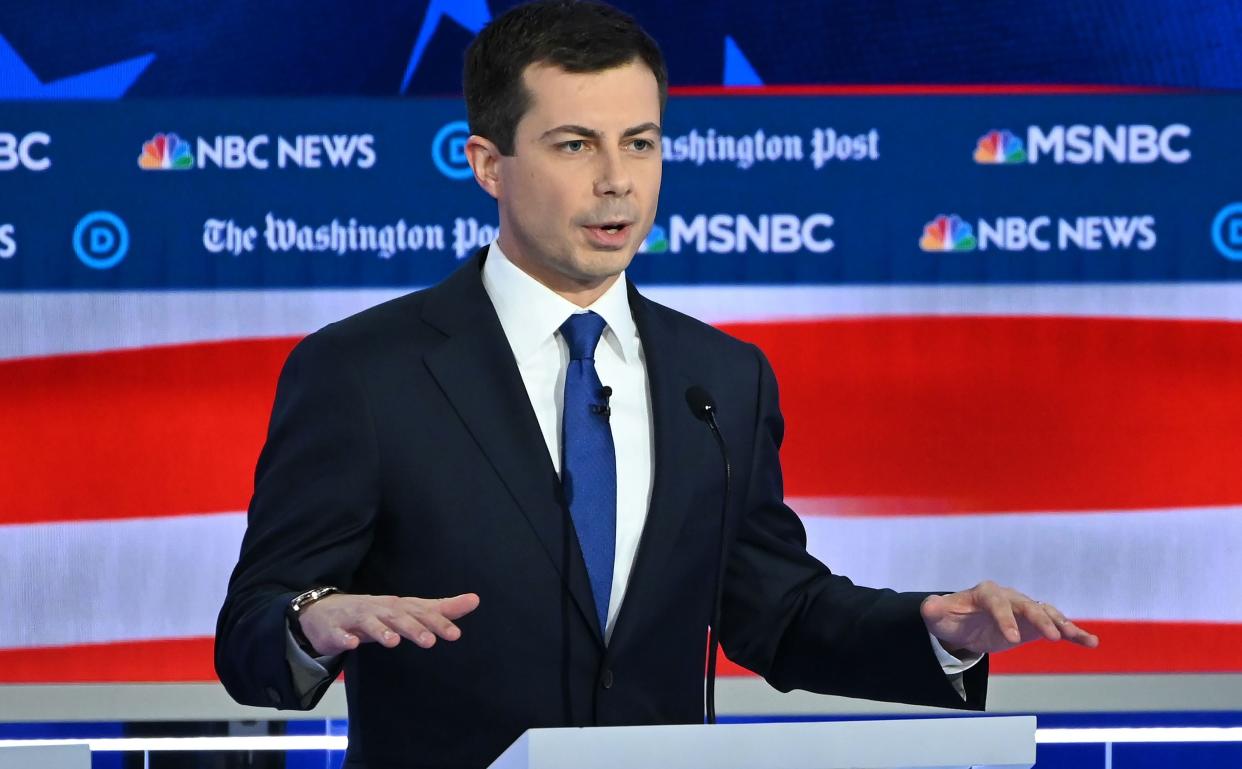Pete Buttigieg Has No Answer For How He'd Win Over Republicans

A major issue for many of the Democratic presidential candidates is how they would bring the country together and heal divisions in a post-Donald Trump world.
Former Vice President Joe Biden has said he’s confident Republicans will have an “epiphany” after Trump is gone and will suddenly come to their senses and work in a bipartisan fashion.
Pete Buttigieg, the mayor of South Bend, Indiana, is another candidate who has touted his ability to bring people together.
“We will fight when we must fight, but I will never allow us to get so wrapped up in the fighting that we start to think fighting is the point,” Buttigieg said in an Iowa ad. “The point it what lies on the other side of the fight.”
During the Democratic debate in Atlanta on Wednesday night, the moderators asked Buttigieg specifically what he would do differently from former President Barack Obama, who also used rhetoric about unity but faced eight years of entrenched Republican opposition.
Buttigieg didn’t really have an answer. He said that the country is very different than it was during the Obama administration: “There is an American majority that stands ready to tackle big issues that didn’t exist in the same way even a few years ago. Even on issues where Democrats have been on defense, like immigration and guns, we have a majority to do the right thing.”
He added that the next president needs to “galvanize, not polarize, that majority,” throwing some criticism at his more progressive competitors ― including Sen. Elizabeth Warren (Mass.) ― who support “Medicare for All.”
“I believe that commanding people to accept that option, whether we wait three years as Sen. Warren has proposed, or whether you do it right out of the gate, is not the right approach to unify the American people around a very, very big transformation that we now have an opportunity to deliver,” Buttigieg added.
Obama, of course, also took a less-than-radical approach toward health care, opting out of a single-payer plan or public option. The health care system in Massachusetts, which was put in place by then-Gov. Mitt Romney ― who, of course, is a Republican ― was even a model for the Affordable Care Act. That fact, of course, didn’t stop Republicans from inexplicably attacking the law as socialist.
At a town hall in Iowa this month, Buttigieg has raised a more specific way he’d win over Republicans who oppose his agenda: going into their districts and applying pressure.
“There’s a big airplane that comes with the Oval Office, right?” Buttigieg said at the town hall. “I believe the best use of that airplane’s to fire it up, fly it into the district or the state of a senator or a member of Congress getting in the way of one of these measures.”
But when asked how his approach would differ from that of Obama, Buttigieg struggled to answer.
“He operated under the constraints of being the last Democrat of the Reagan era. And he also faced constraints of a Congress that was not acting in good faith,” Buttigieg said during his bus tour in Iowa. “And the part about Congress acting in bad faith has only gotten worse among Republicans.”
In 2011, to get support for his stimulus proposal, Obama indeed fired up his airplane and flew it around to redder districts. Obama held rallies in places like Richmond, Virginia, to put pressure on Eric Cantor, who was then the House majority leader.
And presidents have long gone out on the trail to stump for their proposals after their State of the Union speeches.
But it largely doesn’t work, as Obama found out.
In the early days of his campaign, Buttigieg was touting much bolder solutions of structural change ― getting rid of the Electoral College and putting more justices on the Supreme Court. But he discusses those ideas less these days, as he’s taken a firmer position as a more centrist candidate and an alternative to Biden.
Democratic voters seem to want more specifics from their candidates on how they’d accomplish their goals. A HuffPost/YouGov poll conducted ahead of Wednesday’s debate found them skeptical that the candidates can pull it off.
Just 41% of Democrats think Biden will be able to accomplish all or most of his policy goals, and the numbers are lower for other candidates: Only 33% say the same of Warren’s agenda, while 30% of Democrats are confident in Vermont Sen. Bernie Sanders’ ability to enact his political revolution, and just 28% believe Buttigieg can enact most of his plans.
Love HuffPost? Become a founding member of HuffPost Plus today.
This article originally appeared on HuffPost.

